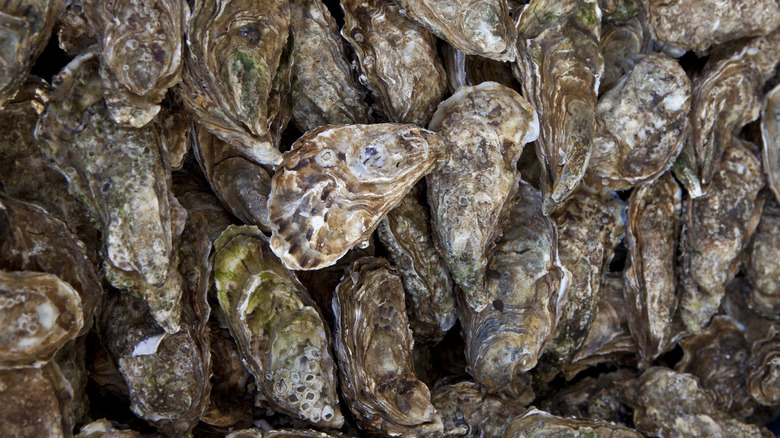FDA Issues Warning About Mexican Oysters Due To Norovirus Concerns
It's no secret that enjoying a platter of raw oysters comes with an element of risk, and in the most recent FDA recall, norovirus is rearing its ugly head to remind foodies why. A batch of raw oysters has just been recalled from restaurants and food retailers in California for potential norovirus contamination, particularly restaurants in San Diego and Los Angeles County. The oysters might have also been distributed to other states, according to an official report by the FDA.
The recall was issued after the California Department of Public Health notified the FDA of a norovirus outbreak in San Diego County on January 10. The Mexican Shellfish Authorities (which are a real thing) have launched an ongoing investigation that traced the outbreak to a specific lot of oysters that were harvested in Bahia Salina, Sonora, Mexico on December 18th or December 27th (the harvest date is printed on the product label). The affected oysters most likely would have been purchased from Sociedad Acuicola GolPac (MX 06 SP), and customers who have purchased them are instructed to dispose of them by throwing them in the garbage. Restaurants that purchased the recalled oysters should take extra sanitation measures to avoid cross-contamination of the norovirus onto other foods.
Since oysters are often eaten raw, pathogen-related outbreaks like these can be especially dangerous. The actual number of consumers who have become ill as a result of this outbreak is yet undetermined. The Bahia Salina growing area was closed for an indeterminate time on January 12.
An ongoing epidemic keeping seafood fans on edge
This isn't the first (or the second) warning or oyster recall related to norovirus outbreaks in recent history. Earlier this month, nearly 100 passengers got sick on a Celebrity cruise ship as the result of another separate norovirus outbreak. In December 2022, norovirus-contaminated oysters harvested from Galveston Bay, Texas were sold in at least eight states, with over 200 reported illnesses. Serious consequences have been documented, as well. In September 2023, a reported vibrio virus contraction was fatal for one consumer in Galveston County.
According to the CDC, norovirus is one of the most common types of food poisoning in the U.S. It spreads quickly and easily, striking foodies with stomach flu-like symptoms. Even though this disease comes from a virus, there's no vaccination for it and hand sanitizer can't kill it (norovirus is part of the 0.1% of germs they're talking about in the 99.9% promise).
Vibrio is a bacterium that loves warm coastal saltwater, and it causes infections in humans after being consumed via raw or undercooked shellfish. Some studies have found that the interplay between norovirus and host microbiota promotes viral pathogenesis. This is made even trickier because norovirus can be difficult to detect, as it typically doesn't affect the smell, taste, or appearance of oysters — which are often vibrio's unwitting vehicle from sea to gastrointestinal tract due to their raw presentation. The increasing frequency and severity of vibrio outbreaks are directly linked to the rising coastal temperatures.

